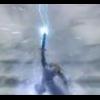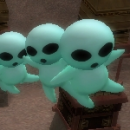It's not my concern at all to look for a reason why this would happen, but rather to look at the myriad of blatant and insistent concordances between ALttP's backstory and events described in OoT, and therefore realize that ALttP's place should be nowhere else than right after a time which lies parallel to when OoT Link met Zelda in two other timelines.
"Similar" does not have to indicate "the same". The Dark Mirror could be the Twilight Mirror because they are similar, but they don't have to be the same. I believe that while ALTTP's BS is similar to OoT / TP, they are not the same. I believe that ALTTP's BS takes place after TP.
These two quotes got me thinking: I think there's a fundamental difference between the two sides here; In any debate, really. In fact, I think all timeline theorists can be separated easily into two factions:
1. The Divinators of Creator Intent[ignore inconsistencies to favor similarities group]
or
2. The Logical Cynics[ignore similarities because of inconsistencies group]
If you can think up better names for them, then feel free to tell me. For the purposes of this post, however, I will refer to them as DCIs and LCs.
DCI:
DCIs like myself have a very loose view on Zelda timeline theorizing. Generally they (or at least I, I can only speak for myself, you know) view the Zelda games as separate, and through similarities build a timeline. The reasoning behind this is that the developers think much the same way, hence the name, creating separate complete games with slight references to other games(These two are similar, maybe the developers are telling us something). This thinking, that similarities should not be overlooked and that differences can be explained, spurs such theories as the Dark Mirror and the Mirror of Twilight being the same, The Triforce and the Light Force being the same (or at least related somehow,) the Oracle Series coming before Link's Awakening, or even the Hero's Shade from Twilight Princess being the Hero of Time (all of which I acknowledge as possible, by the way.) This view can be taken to certain extremes, and can spawn theories like those centered around the Legend of the Fairy, the Single Link theory, and the "Triumph Forks" placement of The Minish Cap, among many others.
DCIs are far more likely to see geographical similarities between games as well, willing to twist and turn a map, lining up this or that landmark, so long as similarities exist. Not to say that all DCIs like, or even care, about geography, just that seeing similarities extends to geography.
LC:
The LCs tend to take a more logical view of the timeline, and take everything with a grain of salt, hence the name. This isn't to say that they're the only ones who think logically(or, for that matter, that DCIs are the only ones who care about intent,) Just that their argument is usually that of logic(because there's differences between the two, they logically aren't the same). Like Raian's quote, the mentality of "Just because they're similar does not mean they have to be the same" seems prevalent. The extreme on this side brings theories such as there being different Master Swords; differentiating between legendary hero and Legendary Hero; and viewing Light Force, Force Gems, and Life force as three entirely separate things.
Don't get all wound up just yet, you don't have to agree with all (or any) of the theories on either side to be LC or DCI. Those aren't the only things on either side, either, just (some of them are) extremes of the mentality. It just seemed redundant to say 'the LC way of thinking leads to theories such as the Dark Mirror and Mirror of Twilight not being the same mirror, the Triforce and Light force have nothing to do with eachother.' etc. etc.
In case you're still having problems seeing what I'm saying, let me give you a visual. There's a continuum, with extreme DCI on one end, and extreme LC on the other. Kind of like this.
 continuum.png 32.45K
2 downloads
continuum.png 32.45K
2 downloadsNot perfect, but it gets the point across. The overlap has probably about 90% of people in it, so obviously almost everybody will take different sides on different issues. The middle line is the 'dividing point,' but that doesn't necessarily mean much. For example, let's say you're somewhere on the LC half, and an argument comes up way far out on the LC side. You would probably take the DCI stance on that issue, yet on the whole you'd be LC. The inverse is also true.
So, yeah. Obviously I have more to say about the DCIs, but that's probably due to a bias I have. If you've got something to add, speak up! Discuss, talk, hopefully this will help with never-ending-debates-that-go-nowhere.
Vote according to which one you are more like; Most everybody (I think) has a little of both.
Edited by CID Farwin, 01 May 2008 - 01:26 PM.






















